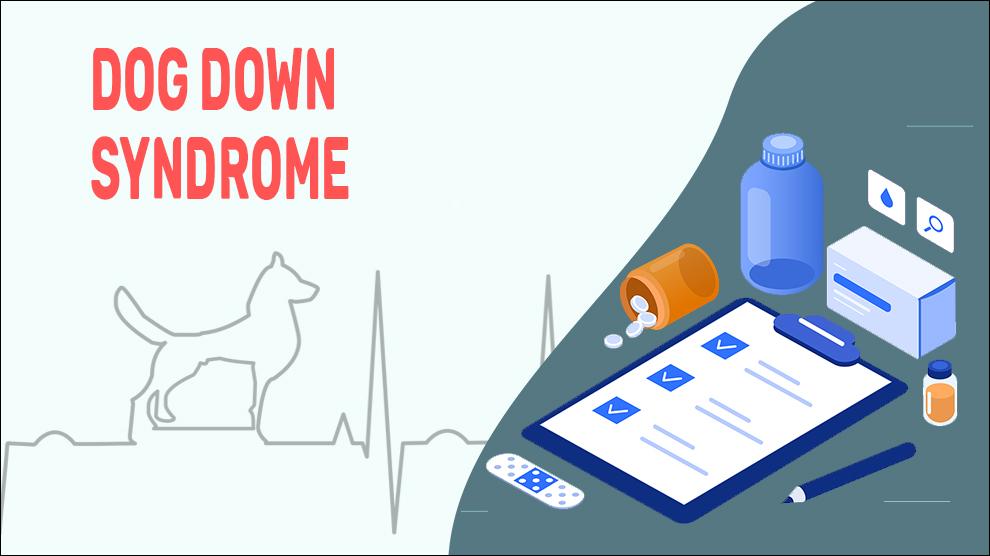Down syndrome is “a chromosome-related genetic condition caused when irregular cell division results in an additional copy of all, or a specific part of chromosome 21. This extra genetic material causes the physical characteristics, developmental changes, and cognitive delays of Down syndrome.”
The distinct physical features of Down syndrome are categorized by flatter faces, upslanting palpebral fissures (outside corners of the eyes that point upward), almond-shaped eyes and may present with developmental delays and mild to severe intellectual disabilities. People with Down syndrome may also struggle with medical issues, like low muscle tone, vision problems heart defects, and/or gastrointestinal issues.
Down syndrome in humans is simple to diagnose and distinguish. But can dogs have Down syndrome?
Simply put, the answer is —not exactly.
Genetically, humans and dogs are distinctly different —in particular, dogs have 39 sets of chromosomes while humans have 23. Down’s syndrome is distinguished by having 23 sets plus the extra copy of chromosome 21 (47 chromosomes). Dogs, by default, have 78 chromosomes. The 21st pair in dogs doesn’t contain the same information as the 21st pair in a human. All or part of chromosome 21 duplication would have different effects in two different species.
Although there’s no “official” Down syndrome diagnosis for dogs, they experience a similar genetic abnormality that resembles Down syndrome in humans.
Many developmental conditions in dogs have some clinical similarities with Down syndrome and are routinely diagnosed in dogs such as Congenital hypothyroidism, Pituitary dwarfism, Congenital hydrocephalus, and Portosystemic shunt, and Growth hormone deficiency.
Again, if you have noticed any of the Down’s syndrome characteristics in your dog, the best thing you can do for your dog is to take them to the vet for an appropriate diagnosis.
Symptoms Of Dog Down Syndrome
- Unusual Facial or Physical Features
- Dwarf-like and deformed facial features
- Small head, short neck, flat-like face, upwardly slanting eyes
- Missing or abnormal patches and heavy shedding
- Hearing problems
- Large, protruding tongue
- Poor muscle tone
Treatment Options For Dog Down Syndrome
Proper diagnosis and treatment should be followed for the developmental conditions in dogs that have clinical similarities with Down syndrome.
Again, if you have noticed any of the Down-like syndrome characteristics in your dog, the best thing you can do for your dog is to get them to the vet for a proper diagnosis and treatment protocol.
For mildly affected dogs - Conservative therapy is enough. Lifestyle changes like avoiding strenuous exercise and a suitable diet may be enough.
For overweight or obese dogs - Maintaining a healthy weight will be very important.
Home Remedies For Dog Down Syndrome
- For a condition like Down syndrome, don’t skip a wellness examination, your dog’s yearly veterinary check-up is not something to be missed.
- Try to get your pups to a vet monthly to monitor their growth and look after mischief-makers.
Prevention Of Dog Down Syndrome
Down syndrome etiology is poorly understood. Specific causes are not yet known. However, Hereditary is, perhaps a factor in many breeds and it is better to evaluate the affected dogs before breeding or at least before getting a dog from a susceptible lineage.
Don’t skip visits to the vet including yearly once comprehensive examinations. Ask Your Veterinarian about skin Supplements and maintain your dog’s optimal weight.
Down’s syndrome is a hereditary abnormality that can be prevented by stopping the breeding of affected dogs so that the risk of passing the condition on to the next generation is averted.
For idiopathic causes, nobody so far knows how to completely prevent it. When you go to a breeder for a new dog or get a dog with an unknown background, ask to screen for hereditary medical conditions or do a health check prior to getting the dog.
Prevent obesity in your dog and commit to maintaining a healthy weight.
Affected Breeds Of Dog Down Syndrome
There is no breed disposition.
Additional Facts For Dog Down Syndrome
1. Causes: Congenital
2. Mortality: Down syndrome like diseases in dogs causes congenital heart defects and gastrointestinal defects which are fatal in dogs.
3. Diagnosis:
- History and physical examination
- X-rays
- Echocardiogram
4. Prognosis:
Veterinarians usually give suggestions for control or management of the problem since there is no proper cure.
Down syndrome has a poor prognosis. Dogs that receive early diagnosis and appropriate treatment have a better prognosis than dogs with chronic conditions.
When To See A Vet
Contact your vet right away, if you notice any of the following:
- Dwarf-like and deformed facial features
- Small head, short neck, flat-like face, upwardly slanting eyes
Food Suggestions For Dog Down Syndrome
What to feed?
High-quality protein sources: Lean boiled meats- chicken, beef, turkey, or lamb
Fiber-rich foods: Apples, pears, oatmeal, and other foods
Vitamin A: spinach, cantaloupe, carrots, and beef liver
Vitamin c: red bell pepper, strawberries, kiwis, etc
Nutrition guidelines you may like to consider:
- Change the food to a different texture or experiment with the food. Some animals do good with solid foods and some with liquid foods.
- Canned food can be rolled into small meatballs. The meatballs must be swallowed by the dog and this stimulates enough esophageal motility to easily pass through the esophagus.
- Low-carb dog food/ peas, sweet potatoes, squash, yams, pumpkin, etc.
- Fresh, lean protein (Lean ground beef, White-meat skinless chicken or turkey).
- Shrimp, salmon, tuna, cod, halibut, trout, herring fish.
- Blueberries, Kale, broccoli, carrots.
- Iron: lean meats like ground beef and lamb, fish, such as sardines and salmon, pumpkin, carrots, and leafy greens.
- Leafy green vegetables (lettuce, spinach, salad greens, parsley, collard greens).
Conclusion
Many ‘Down-like syndrome’ dogs can live normal lives, if they are without any other complications. Dogs with mild symptoms can be managed with medications.

















